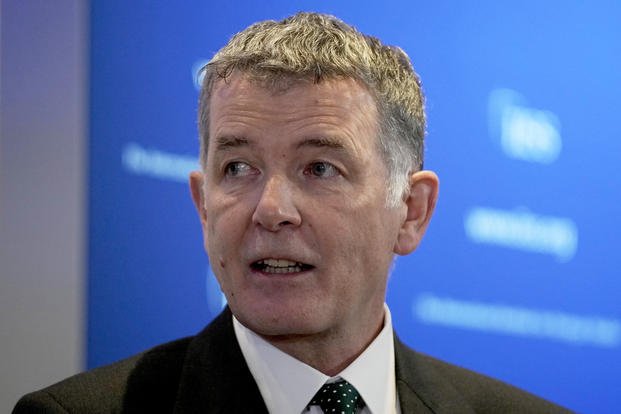PRAGUE — British spies are already using artificial intelligence to hamper the supply of weapons to Russia, the head of Britain’s MI6 agency said Wednesday, predicting that Western spies will increasingly have to focus on tracking the malign use of AI by hostile states.
In a rare public speech, Richard Moore also urged Russians who oppose the invasion of Ukraine to spy for Britain, saying others had already done so since the war began.
“Our door is always open," he said.
In a speech that depicted artificial intelligence as both a huge potential asset and a major threat, Moore said his staff at Britain's foreign intelligence agency "are combining their skills with AI and bulk data to identify and disrupt the flow of weapons to Russia for use against Ukraine."
Calling China the “single most important strategic focus” for his agency, Moore said, "we will increasingly be tasked with obtaining intelligence on how hostile states are using AI in damaging, reckless and unethical ways.”
Moore, who has previously warned that the West was falling behind rivals in the AI race, said his service “together with our allies, intends to win the race to master the ethical and safe use of AI.”
But he said AI would not replace the need for human spies, arguing that the “human factor” will remain crucial in an era of rapidly evolving machine learning.
“As AI trawls the ocean of open source, there will be even greater value in landing, with a well-cast fly, the secrets that lie beyond the reach of its nets,” he said.
He argued that “the unique characteristics of human agents in the right places will become still more significant,” highlighting spies’ ability to “influence decisions inside a government or terrorist group.”
Moore also told an audience at the British ambassador’s residence in Prague that Russia's military campaign in Ukraine had run out of steam and “there appears to be little prospect of the Russian forces regaining momentum.”
He said Ukraine's counteroffensive was proving “a hard grind,” but he was optimistic it would succeed.
Moore said the government of President Vladimir Putin was beset by “venality, infighting and callous incompetence" and the mutiny by Wagner Group mercenary leader Yevgeny Prigozhin had “exposed the inexorable decay of the unstable autocracy over which Putin presides.”
He said Putin was “under pressure” after the brief rebellion and the “humiliating” deal he struck with the help of Belarus to end it. The Kremlin says Prigozhin attended a military meeting in Moscow with Putin after the mutiny.
“Prigozhin started off as a traitor at breakfast, he had been pardoned by supper, and then two days later he was invited for tea,” Moore said “So there are some things that even the chief of MI6 finds a little bit difficult to interpret, in terms of who’s in and who’s out."
He accused Russia of using Wagner as a tool of imperialism in Africa, offering leaders in the Central African Republic, Mali and other countries a “Faustian pact” of protection in return for handing over mineral wealth to Russia.
Moore also called out Iran for fueling further conflict in Ukraine by supplying Russia with drones and other weapons — a policy he said “has provoked internal quarrels at the highest level of the regime in Tehran.”
Speaking publicly about spycraft is still something of a novelty for Britain’s intelligence services. The government refused even to confirm the existence of MI6 until 1992, and public speeches by its leaders are infrequent.
Moore chose to give Wednesday's address in the Czech capital, home of the 1968 “Prague Spring” freedom movement that was crushed by Soviet tanks.
Evoking that moment, he said many Russians now felt “the same tugs of conscience as their predecessors did in 1968." The crushing of the Prague Spring spurred a wave of defections from the USSR to the West.
“I invite them to do what others have already done this past 18 months and join hands with us," he said and reassured prospective defectors that “their secrets will always be safe with us.”
Most intelligence defectors' names are never known — unless something goes wrong. Former Russian intelligence officer Sergei Skripal and his daughter were poisoned and seriously sickened with a Soviet-made nerve agent in 2018 in the English city of Salisbury, where he had been living quietly for years.
Moore recounted how an agent codenamed Ecclesiastic, who penetrated German intelligence for MI6 in 1944, was looked after by the service until her death, aged 100. He said MI6 agents then gathered to scatter her ashes in the English Channel.
“Our loyalty to our agents is lifelong, and our gratitude eternal,” he said.











